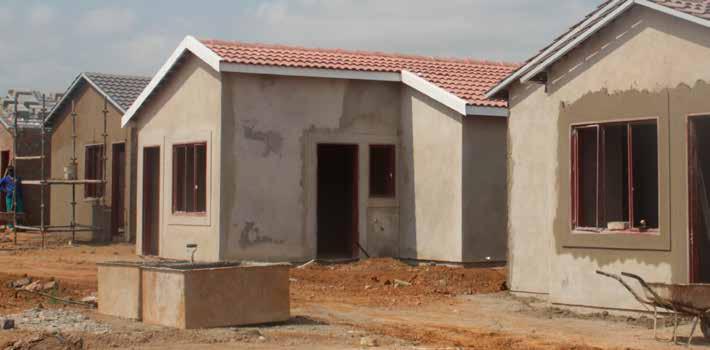
10 minute read
Housing water and sanatation
by kwedamedia
HOUSING, WATER AND SANITATION
AT LOCAL GOVERNMENT LEVEL
Advertisement

In a previous article in this edition of Municipal Focus it was said that local government is at the coalface of socio-economic development. It is at local government level that the citizens of the country experience the impact of the constitution. Section 7(2) of the constitution imposes four different types of obligations on the state when it comes to the fundamental rights entrenched in the Bill of Rights: the obligations to respect, protect, promote and fulfill. These obligations exist with regards to rights to both a civil and political nature and with regard to economic, social and cultural rights. The obligation to respect these rights means that the state must refrain from interfering with their enjoyment.
The obligation to protect means that the state must prevent violations of third parties. The obligation to promote fundamental rights means the state must encourage and advance the realization of these rights that includes public awareness. The obligation to fulfill fundamental rights means that the state must take appropriate legislative, administrative, budgetary, judiciary and other measures towards their realization. In an individual case of an infringement of a right

the question is whether all three spheres of government that make up ‘the state’ are jointly responsible for all four of these obligations or whether the distinctions can be made between them. This issue is important, especially with regard to the social, economic and cultural rights that often require positive state action with substantial budgetary consequences. Who must do what?
National government can devolve powers and decentralise the effort to realize economic, social and cultural rights but it remains fully accountable to its own citizens for their realization. Despite this the state can and should be held accountable for the realization of socio-economic rights and is obliged to provide basic social services to fulfill them. The South African constitution contains an intricate system of allocation of responsibilities to various spheres of government. Yet the state must uphold and promote these rights. It therefore should be interpreted that provincial and local government are, together with national government jointly responsible for the realization of economic, social and cultural tights.
Local government shares with provincial and national government the responsibility to respect protect and promote all the fundamental rights of the Bill of Rights, including the economic, social and cultural rights. Local government’s aggregate budget consists mainly of moneys raised by municipalities themselves


ORBIT College is one of the 50 public Technical Vocational Education and Training Colleges (TVET) countrywide that specialises in priority skills development. We are situated in the North West Province with campuses in Rustenburg, Brits and Mogwase. TVET Colleges are part of the Department of Higher Education and Training (DHET). Students who study at ORBIT TVET College get a head start to a great career due to the focus on responsive, relevant programmes that develop critical and scarce skills
REPORT 191 (NATED) PROGRAMMES
Engineering Studies N1 - N3 (Artisan Development Programmes) Engineering Studies N4 - N6 Business Studies N4 - N6 Utility Studies N4 - N6 Educational Studies N4 - N6 Performing Arts N4 - N6 Art and Design N4 - N6
NATIONAL CERTIFICATE (VOCATIONAL) NQF LEVEL 2 - 4
Engineering related & ICT programmes Business & Services-related programmes

OCCUPATIONAL AND ACCREDITED SKILLS PROGRAMMES (Accredited by SETAs)
For more information on programmes offered please visit http://www.orbitcollege.co.za
Due to a severe skills shortage in the Engineering Sector, the Department of Higher Education and Training (DHET) is looking to increase the number of students enrolled and trained in priority and critical skills areas. Artisans play a critical role in the needs to produce 30 000 delivery of services especially in the artisans a year to help the engineering trades, and South Africa economy grow.
N2 Certificate with trade theory and 3 years’ relevant work experience Technical Trade Theory quality-assured by a SETA and a minimum of 3 years’ relevant work experience (NQF Level 3) Relevant National Certificate (Vocational) Level 3 Engineering qualification & 3 years’ relevant work experience Relevant National Certificate (Vocational) Level 4 Engineering qualification & 18 months’ relevant work experience

DHET TVET College bursaries - Available to students who have registered for NC(V) or Report 191 (NATED) programmes
College bursaries – Available to compliant students who do not qualify for the DHET TVET College bursaries
For more details on bursary information please visit http://www.orbitcollege.co.za/bursaries.html How to contact us

and supplemented by national government grants and payments for the performance of agency functions. Local authorities raise revenue and receive grants based on their powers and functions determined by the constitution. The right of access to housing
Section 26 of the constitution states that everyone has the right of access to adequate housing and that the state must take measures to achieve the realization of this right. The question is which sphere of government carries the primary obligation for taking administrative, legislative and budgetary measures with regard to the right to housing? The National Housing Act provides the national framework for housing including the roles and responsibilities of the three spheres of government.
The national Minister of Housing has the overall responsibility for a sustainable national housing development process in consultation with all the provincial MEC’s for housing and the national organisations representing municipalities. The Minister must ensure that the national department has delivery goals as well as facilitate provincial and local delivery goals. In addition the Minister must assist provinces to develop their capacity to facilitate housing development and also support the capacity of municipalities to do the same.
Sections nine and 10 of the Act are critical for reviewing government’s strategy on the role of local government. In section nine, the Act places housing development squarely within the realm of each municipality’s integrated development plan (IDP). In fact housing development will undoubtedly be one of the most pertinent areas of each municipality’s IDP. Municipalities must take all reasonable and necessary steps within the framework of national and provincial housing legislation to achieve the following: • Enabling residents of the municipality to have access to adequate housing on a progressive basis • Preventing or removing conditions that are not conducive to health and safety • Provide a package of water, sanitation, electricity, roads, storm water drainage and transport services in an economical and sustainable way.
Further the municipality must set housing delivery goals for its area and designate land for housing development. It must plan and manage land use and development and create and maintain a public environment conducive to housing development that is also financially and socially viable.
The municipality is best placed to solve housing disputes and is therefore instructed by the Act to promote the resolution of these conflicts. The Act further expects municipalities to initiate, plan and coordinate appropriate housing development in their area of jurisdiction.
Any municipality may participate in a national housing programme. It can do so in a variety of ways. For example, it can enter into a joint venture with a developer or establish a business entity for a housing project. It can also administer a national housing programme in its area in accordance with Section 10 of the HA 1997. A municipality can apply to its MEC for housing to be accredited for the purposes of administering a national housing programme. If it complies with the criteria, the municipality must be accredited. An accredited municipality can administer the programme and for that purpose exercise the powers and perform the duties of the provincial housing development board. However, the municipality remains subject to the directions of the MFC. The MFC can, alter consultation with the provincial housing development board; allocate money for the administration of the national housing programme to an accredited municipality. The municipality must maintain separate accounts of that money. The municipality has a reporting duty towards the provincial accounting officer. The MEC regularly reviews the performance of an accredited municipality and can intervene if it fails to so perform. What then are local government’s obligations?
If one concludes that local government does not bear the primary obligation to fulfill these rights, what, then, are its obligations with regard to housing, given the fact that it does bear the obligation to respect, protect and promote them? It is clear from the Constitution that local authorities cannot simply ”shrug off” any responsibility for the right to housing or for children’s right to shelter. The obligations to respect, protect and promote these rights are there for local authorities to uphold
Section 9 of the HA 1997 is instructive here. It makes clear that local government has distinct duties with regard to housing. The duties exist notwithstanding the facts that local government is not in the sphere primarily responsible for housing and that it can participate in national housing programmes. They flow directly from the obligation to promote the right to housing. The HA 1997instructs local authorities to contribute to the realization of the right to housing, within their constitutional mandate, by making land available by ensuring provision of services such as water, sanitation, electricity, roads, storm water drainage and transport by ensuring access to housing for its inhabitants etc. Without local government performing these tasks, the right to housing is meaningless. The inclusion of these functions in the HA1997 is meant to combine the efforts of national and provincial governments with the efforts of local government to realize a meaningful right to housing. These duties are also relevant in the context of realising children’s right to shelter, because many of these more or less ancillary aspects relate to the meaningfulness of both the right to housing and children’s right to shelter.
The minimum obligations of local government in he process of realising the right to shelter therefore include matters such as: • Making land available, a “site” on which the provision of shelter can take place – in many cases, municipalities have greater access (through ownership) than provinces to land in their jurisdiction that is appropriate for causes like these. • Providing basic water services, • Providing basic sanitation: and • Facilitating the realization of the right to shelter, by - Facilitating communication between the residents and the provincial housing department, including the resolution of conflicts; and - Assisting the provincial housing department on any relevant matter
This may include playing a coordinating role in the implementation of the realization of the right to shelter.
These minimum obligations flow directly from local government’s obligation to promote the right to housing and shelter. The local authority is therefore not only responsible for ensuring the provision of these services, but must also carry the cost for them, within its available resources. Conclusion
Our constitution makes it clear how local government, together with national and provincial government should jointly act in concert to ensure that the basis right to adequate housing is made available to all South Africans. Local government plays a pivotal role in creating a conducive environment to overcoming the tremendous problem of housing. South Africa has a very large and ugly informal squatter sector that has become a melting pot of service delivery protests for housing. The constitution together with many constitutional court judgments has spelt out how the various tiers of government should work together to ensure that the housing problem in South Africa should be addressed. It now needs political will to solve the problems of housing.
Acknowledgement: Sabinet Gateway




